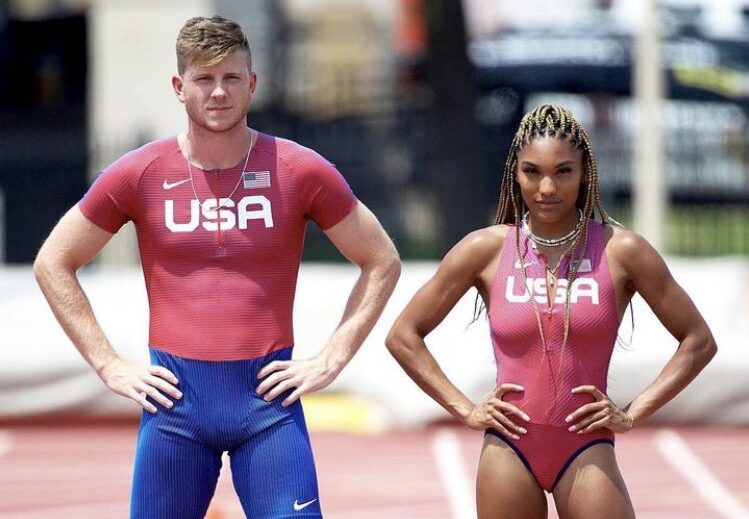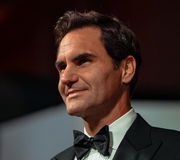

Track and field consistently delivers thrilling action each season, but its spotlight tends to shine brightest during the Olympics. This long-standing focus has been a significant challenge for the sport. However, it’s not the only issue; financial difficulties continue to plague many athletes, even those who have achieved the pinnacle of success by earning gold medals for their countries, such as Hunter Woodhall and Tara Davis-Woodhall.
Watch What’s Trending Now!
The Paralympian and Olympian duo, Hunter Woodhall and Tara Davis-Woodhall, have been vocal about the financial challenges in their sport, frequently sharing examples to highlight their struggles. However, they are not alone in expressing frustration. Recently, another track and field athlete raised concerns after Team USA announced the per diem allocation for the Paris Olympics, adding to the growing discourse on athlete compensation.
ADVERTISEMENT
A call for awareness in track and field
No matter the sport, an athlete’s major source of income comes from the sporting events, apart from sponsorship deals and other investments. Therefore, when an athlete receives less than their fair share for their efforts, it often sparks significant protests. The same issue has been in track and field for a long time, and even though officials are working on solutions, they’re not enough to satisfy the athletes’ needs.
A few months ago, Olympians like Alaysha Johnson, an American hurdler, went to the French capital to attend the Olympic Games. Surely, Paris isn’t cheap to stay in, but she and other track and field stars did expect to get back their spending in the form of per diem. However, when they recently received it, she put out an intriguing but concerning statement on her official X profile, stating, “The USA just sent out the per diem for the Paris Olympics that happened in August… it was $190. Go Team.”
Top Stories
Greg Biffle’s $4M Worth Prized Possession Still Without a Buyer Leaves NASCAR Fans Heartbroken

LIV Golf Braces for Another Possible Exit in Wake of Brooks Koepka Departure

Sean Payton Announces Retirement Plans as Broncos HC Demands Improvement From Bo Nix & Co. Before Playoffs

Biff Poggi All But Confirms Bryce Underwood’s Michigan Future After Announcing His Own Departure

Roger Federer Draws Criticism from Swiss Government Chief for Tourism Boom in Country

Amanda Balionis Confirms New Relationship Ending Months of Rumors

While there was sarcasm in the statement, it was much more of a stern message than a hilarious one. She expressed her dissatisfaction with the officials’ decision to only provide them with a per diem of $190, given their prolonged stay in the French capital. According to various sources, athletes from different sports vary in their spending, which leads them to the Olympics. These expenses include travel, accommodation, training, equipment, and many more requirements, which can stack up to a whopping $7,000.
ADVERTISEMENT
The USA just sent out the per diem for the Paris Olympics that happened in August… it was $190. Go Team 😂🤪
— Alaysha ‘Lay’ Johnson OLY (@ImJustLaylay) December 7, 2024
It is entirely understandable for athletes who bring medals and honor to their nation to express such disappointment. This isn’t the first time an athlete has spoken out against a system that has caused hardship for themselves and their peers. Track and field already face numerous challenges, with financial struggles being among the most frequently discussed. Even Paralympians like Hunter Woodhall have openly addressed the disparities in pay within the sport, shedding light on an issue that affects many athletes across the board.
ADVERTISEMENT
Hunter Woodhall exposing the big picture
Hunter Woodhall wasn’t about to sit down and not talk about the difference between the participating athletes in track and field. He highlighted his point by giving an example of himself and his wife, Tara Davis-Woodhall, during an interview with GQ, stating, “For us specifically, a long jumper and a Paralympian, there’s no money. I didn’t get the $50,000, because the Paralympics doesn’t pay that. So I made thirty-seven-five. That’s it.”
His call for concern was valid, as there’s a $37,500 bonus from the USA’s Olympic governing body and also another $50,000 from the World Athletic Olympic Committee. However, since Hunter is a Paralympian, he didn’t receive the $50,000. This is no small amount for a sport that already underpays its athletes. The Woodhalls’ concern also highlights the sport’s declining popularity, as months after the Paris Olympics, the gold medal-driven spotlight has already dissipated. Overall, it comes down to the officials to make major decisions and fix the problems, as without the athletes competing after losing interest, initially there won’t be any fans to look forward to the events.
ADVERTISEMENT
ADVERTISEMENT
ADVERTISEMENT
ADVERTISEMENT

